|
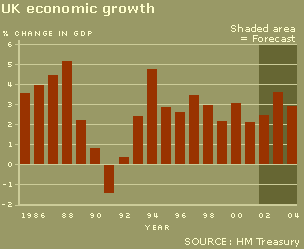
|
| UK Economic Growth |
Since the sharp economic slowdown of the early 1990s, the UK economy has been growing at a relatively steady
rate of around 2.5% each year. However, most forecasters expect the economy to slow down this year to around 1.5% despite
more optimistic Treasury projections. But the government can claim credit for a lack of severe "boom-bust" cycles in the UK
economy.
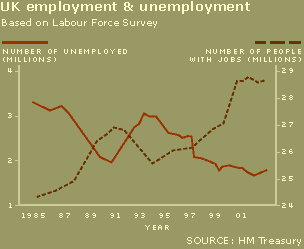
|
| UK Employment & Unemployment |
Unemployment fell sharply from the mid 1990s. On the government's broad measure, the Labour Force Survey, it is now below
2m, and based on the number of people claiming benefit, it is below 1m. But the fall is now leveling off. The number of people
in employment increased slightly less, as more people retired early.
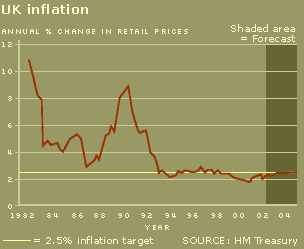
|
| UK Inflation |
Inflation in the UK has also been quite contained since it approached 10% in the early 1990s, moving below
to the government's target of 2.5% (excluding mortgage payments). The fall, however, preceded the government's decision to
make the Bank of England independent and responsible for setting interest rates. Inflation is likely to stay close to its
target range.
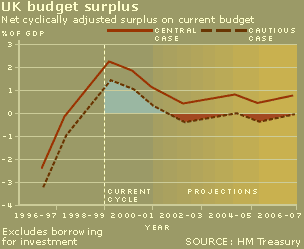
|
| UK Budget Surplus |
The big budget surpluses are likely to disappear as the government increases spending faster than taxes.
Many analysts believe that the more pessimistic scenario is the most likely, with the Chancellor having to borrow up to £15bn
to fund his ambitious plans. Under the Treasury's rules, borrowing for investment does not count towards this measure of the
surplus.
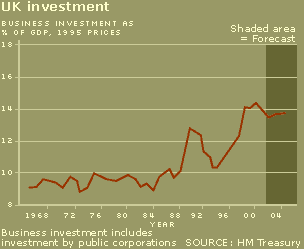
|
| UK Investment |
Business investment is considered by the government to be a key measure of its success in making the UK
economy more productive. After rising sharply in the late 1990s, however, business investment has levelled off, despite various
tax incentives. Neither have the government's own public investment plans as yet shown big increases.
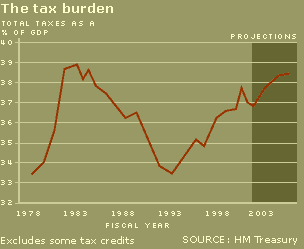
|
| UK Tax Burden |
The tax burden has been rising since the mid l990s as both Labour and Conservative struggled to correct
a huge Budget deficit. After a brief fall in the first two years of Labour (partly due to the use of tax credits, which count
as negative taxation), the tax burden is set to rise again, to around the historic average of 38-39% of GDP - and perhaps
higher if the economy falters.
|
